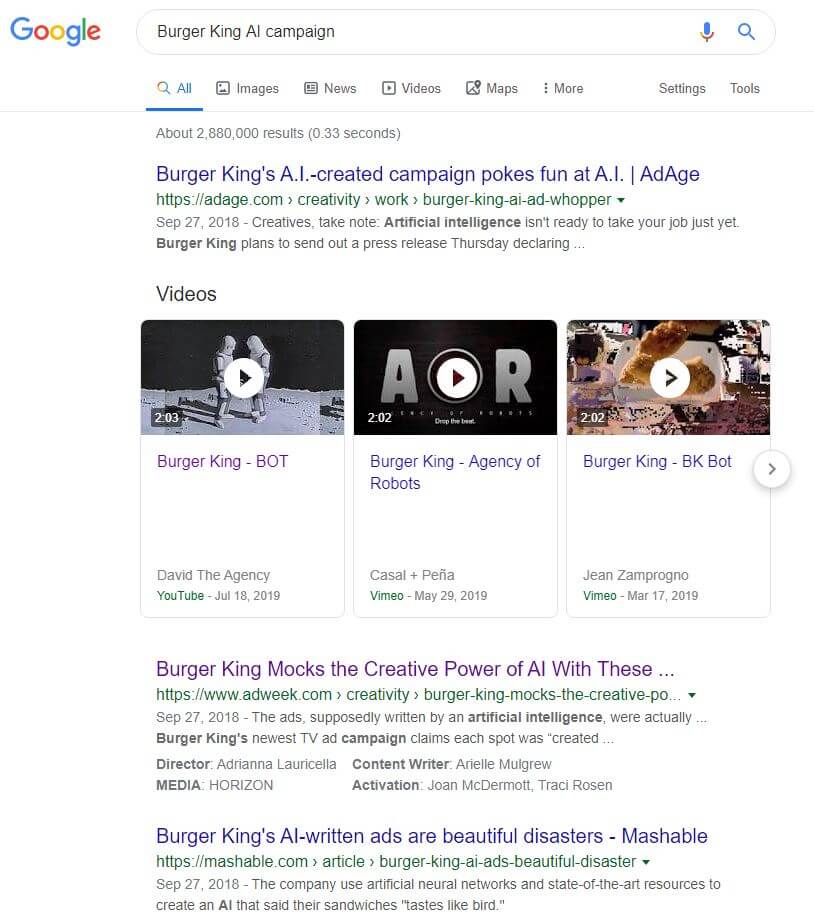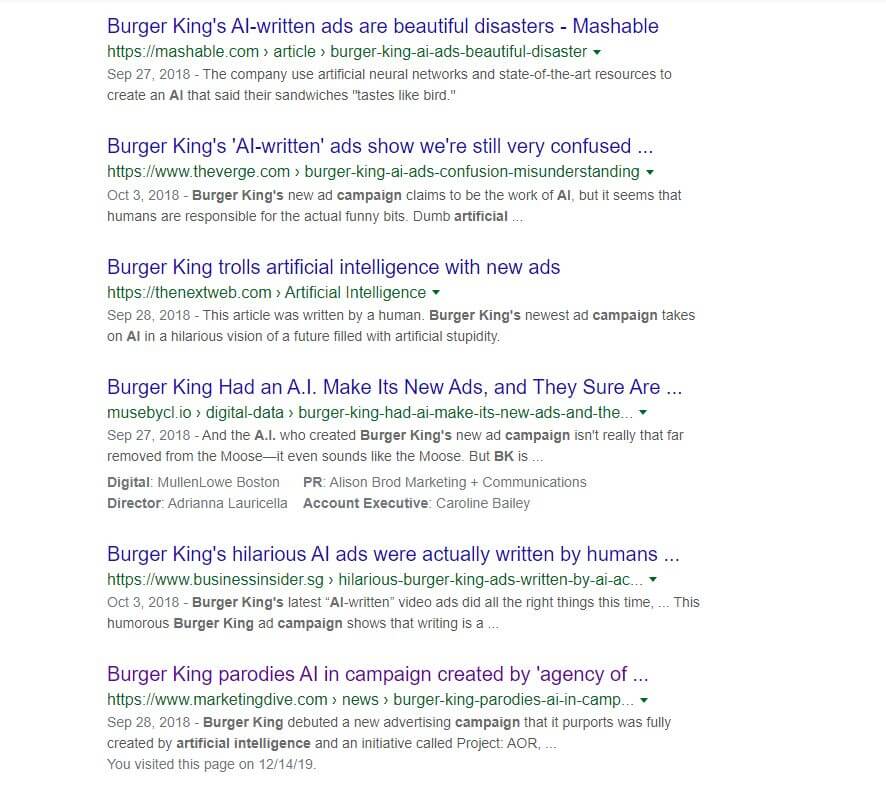World’s most dangerous: Pretentious creatives with a budget.
“But George, they won awards. And Burger King’s ads were so, damn, creative.
Last year, Jenny B-School called this type of pop-culturish, “buzz-worthy” advertising “The Future of Communication” (… she read it on Adweek!) and she thinks we should really have our interns learn how to do it.
Even Bob, the Manager, liked it. And you know how he usually doesn’t like anything he doesn’t understand. So what gives, George? Why are you featuring this campaign on your Dumb Marketing Series?”
Here is the shower thought: Attention is everything.
And if enough people see something, if there’s massive exposure, then something good ROI-wise has just got to come from it.
Right? Wrong.
Yet that must’ve been what the creatives at David Miami, the award-winning ad agency behind Burger King’s AI-themed 2018 campaign, were thinking.
Now don’t get me wrong. I liked David’s campaign. I found it clever and funny and unusual.
But advertising is not about producing the 30-second equivalent of “Oscar Bait” and hoping to make headlines with your buddies.
Advertising is about serving a business goal. And at the end of the day, the goal is (and has always been) one: To make the business more money.
But before we unpack why Burger King’s Dumb Marketing campaign was irrelevant from a business perspective, let’s first take a look at some of these…
Wonderfully ridiculous ads.
Introducing…
Pretty cool ad, huh?
And it gets better. Check this next one out.
“:: BK Logo appears::”
(eyeroll intensifies)
Look. I get it. It’s clever, funny, and unusual.
At its core, it is a deeply introspective, distinctive, honest, and fun way for a creative team to say, “Hey, technology and buzzwords are hot right now, but without us, without a group creative minds to steer the ship towards the right direction, it’s all for nothing. We still matter and probably more than you think.”
Touching.
Yet not at all relevant to selling more burgers and fries, is it?
The core idea that AI can’t sufficiently replace a great creative mind is irrelevant to the business goal of making more money.
I am also willing to bet that whether a company’s advertising is handled by creative geniuses, AI, a bunch of clowns, circus monkeys, or heck, miniature pink elephants…
… is not nearly as relevant to our burger purchasing habits as is the product’s quality, taste, price, accessibility, and a bunch of other “boring,” “non-creative” factors.
"But think of all the new earned media!"
A fair and valid point, my friend.
After all, at first glance, the campaign was a hit and made for a metric ton of shares, mentions, reposts, and reviews (heck, you’re reading a “review” right now!).
But look a bit closer, and you’ll see a wildly different picture.
Uhm, sorry, what is “earned media” again?
Briefly, earned media is any content written about you or your business that you haven’t paid for or created yourself.
Some examples include a newspaper article, a TV segment, a social media mention, and organic SEO traffic.
To learn more, check out Titan Growth’s article on the topic.

… and then a whole bunch of more advertising and marketing geeks.

Marketing geekiness aside though, what’s most important to understand is that these earned media mentions… are all about patting the David Miami agency on the back.
“Hilariously humorous.”
“Fresh and creative.”
“Not quite as interested in Burger King’s history as everyone else.”
(… as if that’s somehow a good thing.)
But what about selling burgers?
Burgers?Boring. Fries? Don’t make us laugh, darling. We’re a creative agency.
Did this campaign make money?
I’m not privy to juicy details, but based on a quick search I did, Burger King’s stunts did not save the company from a 1.2% drop in system-wide sales growth, a 1.1% drop in comparable sales, and a further 0.4% drop in net restaurant growth since 2017.
Of course, whether the campaign worked out well financially will be more apparent after some time passes.
But we can reasonably assume that it was no financial breakthrough. And in making our assumptions, the past can be quite instructive.
You see, the reason why I’m writing this post is that David Miami’s campaign is only the latest in a long, long string of highly publicized, yet remarkably not profitable advertising campaigns.
Take “Dilly Dilly,” for instance, launched by Bud Light, which became incredibly viral in 2017.
Go ahead, check it out.
This little ad achieved national meme status at a remarkable speed.
People kept talking about the “Dilly Dilly” phenomenon… but did it move any product or just trend on Twitter?
Bud Light sales continue on a half-a-decade-long downward slide, without any hint of a positive “Dilly Dilly” boost.
And of course, this is no recent phenomenon. This type of buzz-inducing, money-leaking ad campaign has been robbing companies off of their profits since decades ago.
Here’s a final – and most instructive – example. Here’s Nissan’s 1996 toy commercial, which also garnered much acclaim, recognition, and back-patting.
Check it out.
Entertaining?
Maybe. If you dig toys.
What was oh-so-not-entertaining, however, is that despite its 200.000.000$ price tag, this campaign was outrageously ineffective.
First, it got Nissan sued by Mattel Inc. (the toy manufacturer). Second, the campaign caused a whopping 17.1% drop in sales while it ran.
What's the verdict?
The verdict is simple.
Navel-gazing entertainment – “eyeballs” value – without monetization is just exposing yourself in public.
It’s just that in advertising, you get an award for creativity instead of a restraining order and jail sentence.
Frankly, I find the ads we explored today incredibly naive.
And I’m inclined to believe campaigns like that are one of the big reasons why CMOs typically have shorter lifespans than CEOs at most companies.
(Who said big companies make no mistakes?)
…
Dear brand people.
Don’t become enamored by your role as entertainers. As marketers, we’re NOT pop-culture merchants. We’re there to make the business more money.
I know, I know, I know. The buzz is addicting. Watching your catch-phrase grow is like a secret, personal high.
And yet it should not come at the expense of sound business judgment.
You’ve been warned.
Next week: We’ll explore the opposite side of the Dumb Marketing spectrum – direct marketing sins.

